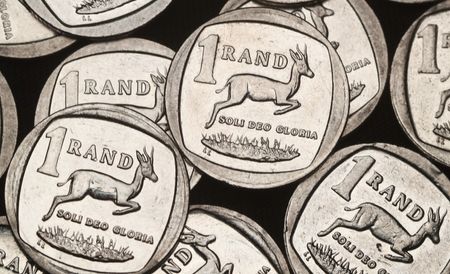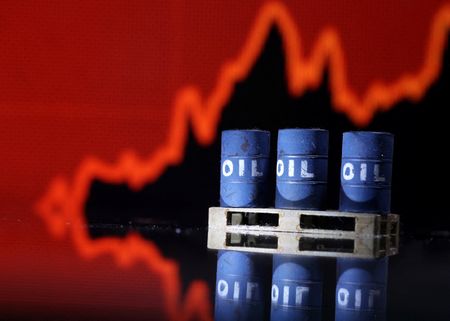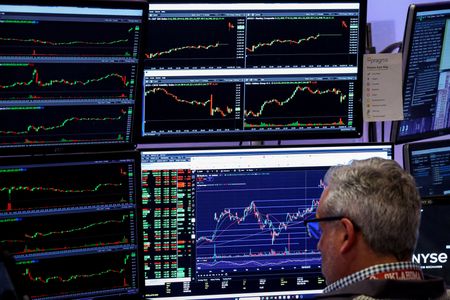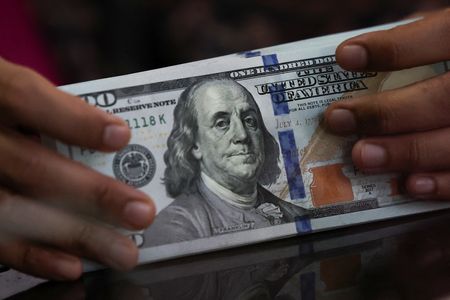By Sinéad Carew and Samuel Indyk
NEW YORK/LONDON (Reuters) -MSCI’s global equities gauge fell on Tuesday, while the dollar declined as investors grew frustrated with the lack of U.S. trade deals and waited for a Federal Reserve update, while oil futures rebounded from Monday’s sell-off.
However, U.S. Treasury yields fell to their lowest levels for the day in afternoon trading after a well-subscribed 10-year notes auction showed demand for government bonds.
In currencies, the dollar lost ground against multiple currencies while the euro rose after German conservative leader Friedrich Merz was elected chancellor by parliament in a second voting round, hours after a shock defeat.
Investors focused broadly on trade tensions between the U.S. and the rest of the world, particularly with China, the world’s second biggest economy.
Last week, Beijing said it was evaluating an offer from Washington to hold talks. But U.S. Treasury Secretary Scott Bessent said on Tuesday that while President Donald Trump’s administration was negotiating with 17 major trading partners, it had not yet engaged with China.
Bessent said the U.S. could announce trade deals as early as this week, but did not say with which countries.
“It’s gone from pretty much balance between people who are worried and people who think this will work quickly because it’s just a negotiation. It tips every few days a little bit more negative,” said Rick Meckler, partner, Cherry Lane Investments, a family investment office in New Vernon, New Jersey.
And he added that “China and the trade policy with respect to China is a very controlling factor into where this market is headed. It’s hard to tell if they’re going to reach some kind of deal or if it’s going to be an all-out trade war.”
Meanwhile, on Tuesday, Britain and India clinched a long-coveted free trade pact after U.S. tariff turmoil forced them to hasten efforts to increase their trade in whisky, cars and food.
On Wall Street, the Dow Jones Industrial Average fell 389.83 points, or 0.95%, to 40,829.00, the S&P 500 fell 43.47 points, or 0.77%, to 5,606.91, and the Nasdaq Composite fell 154.58 points, or 0.87%, to 17,689.66.
MSCI’s gauge of stocks across the globe fell 3.38 points, or 0.40%, to 842.83. Earlier, the pan-European STOXX 600 index closed down 0.18%. Germany’s DAX index ended down 0.4% after falling about 2% earlier.
Investors are waiting for the Fed to make its next policy announcement on Wednesday after the conclusion of a two-day meeting. The central bank is widely expected to keep rates steady but investors will look for signals on future rate cuts.
In bonds, U.S. Treasury prices rose as a well-received auction of the benchmark 10-year note suggested demand for U.S. government bonds remained intact, boosting other maturities across the curve as well.
The yield on benchmark U.S. 10-year notes fell 3.5 basis points to 4.308%, from 4.343% late on Monday, while the 30-year bond yield fell 1.8 basis points to 4.8112%.
The 2-year note yield, which typically moves in step with interest rate expectations for the Federal Reserve, fell 4.6 basis points to 3.795%, from 3.841% late on Monday.
“The bulk of today’s early price action lacked conviction,” said Vail Hartman, U.S. rates strategist, at BMO Capital in New York. “It wasn’t until the strong reception to the 10-year-auction that we saw a more durable breakout lower in yields.”
In currencies, Trump’s trade policies have fuelled significant waves of dollar selling since April.
On Tuesday, the dollar index, which measures the greenback against a basket of currencies including the yen and the euro, fell 0.62% to 99.19.
The euro was up 0.57% at $1.1378 while against the Japanese yen, the dollar weakened 0.91% to 142.39.
Sterling strengthened 0.64% to $1.3376 while the Canadian dollar strengthened 0.43% versus the greenback to C$1.38 per dollar.
“The market is getting nervous that we’re starting to eat away at the schedule since the 90-day tariff reprieve without anything meaningful being announced,” said Eugene Epstein, head of structuring for North America at Moneycorp, referring to Trump’s April 9 announcement of a 90-day pause on some tariffs to give room for trade negotiations.
In energy, oil gained 3% on signs of higher demand in Europe and China, lower production in the U.S., tensions in the Middle East. Also buyers emerged the day after prices fell to a four-year low on concerns about an OPEC+ decision to boost output.
U.S. crude settled up 3.43% or $1.96 at $59.09 a barrel while Brent settled at $62.15 per barrel, up 3.19%, or $1.92.
Gold prices rose to a two-week high, supported by post-holiday buying from China and concerns over potential U.S. tariffs on pharmaceutical imports, while investors waited for the Fed policy meeting. [GOL/]
Spot gold rose 2.64% to $3,421.49 an ounce. U.S. gold futures rose 3.34% to $3,421.90 an ounce.
(Reporting by Sinéad Carew, Chibuike Oguh, Gertrude Chavez-Dreyfuss in New York, Sam Indyk in London; Editing by Kate Mayberry, Sharon Singleton, David Evans, Aurora Ellis and David Gregorio)











